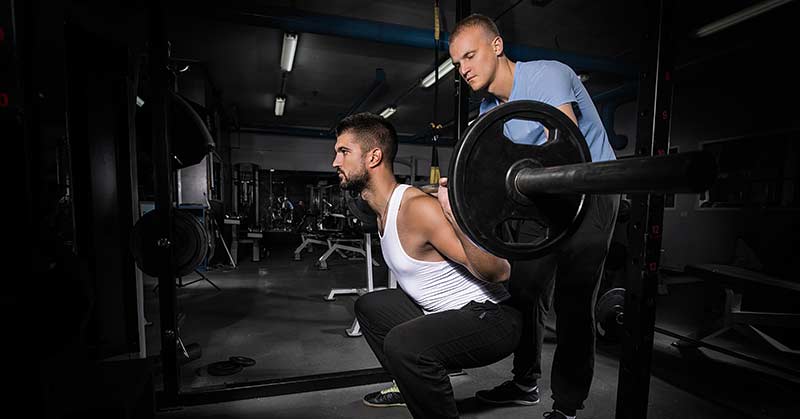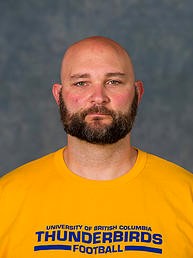
Applying for a position in strength and conditioning is a competitive undertaking. With more candidates than there are job postings, it’s imperative to make yourself stand out in the crowd.
In this article, Carmen Bott, Performance Coach with Wrestling Canada and Instructor of Kinesiology, teams up with Joe McCullum, Head Strength and Conditioning Coach at the University of British Columbia. Combined, the two have over 45 years of coaching experience and have reviewed hundreds of resumes. They take this opportunity to share with the younger generation some helpful pointers on landing a strength and conditioning position.
Note: The opinions reflected in this article are Carmen’s and Joe’s views and are not a reflection of their employers. They offer professional advice to those wanting to succeed in the field of strength and conditioning.
Coach Carmen: Coach Joe, in your opinion, what are the common mistakes you see as you scour over CVs.
Coach Joe: Many common mistakes I see in the cover letters and CVs are:
A one-page resume and cover letter. If you’re applying for a job in a fast-food restaurant, keep it short. If you’re applying for a professional position, highlight what you need to. Employers are looking for the best candidate possible and will likely take the time to read what you have done and will contact others in the industry to get feedback about you. (So over shooting your role when your job was to bring water to a team you interned with may be discovered.)
Adding your dissertation. Don’t add your dissertation unless it’s required. Keep to the job description.
Offering a Word document. Sending a Word document instead of a PDF.
Exaggerating experience. Saying that you have vast experience when your resume says otherwise. If your only experience is that of an intern or student coach, those who are hiring are fairly well aware of what these entail, especially if they are one-offs with session testing or movement screening.
Taking on numerous internships. These are great opportunities if you can afford to work for next to nothing, but holding a job for a period of time is attractive to most employers. If your resume shows that you have bounced around, it raises red flags for some people. I’m aware the average person doesn’t stay in the same position for more than 2-3 years until they settle into their career, but showing 3-month stints at multiple locations makes me question why they bounce so often. If an employer is looking to hire a full-time team member, they may see merit in someone showing the ability to hold a job vs. a scheduled time commitment associated with an internship.
Talking about what the company can do for you. Don’t explain how the company will foster your professional growth and how much this will better help you. Explain how you will contribute to the growth of the company by doing “X.” In my role, I collaborate and mentor upwards of 20 student coaches and 10 graduate assistants each term. In this scenario, I’m aware of what we’ll do for their professional growth, so there is little need to talk about it. If you’re applying for a full-time position, talking about how the job can benefit you may come off as if your growth is more important than the company’s.
Name dropping. Don’t name drop your mentors and employers throughout your cover letter and resume. If you list them as references, we will likely call them. Unless you’re applying out of the country, most people in the sport performance industry are 2-3 degrees of separation away from each other and will likely connect if needed.
Including irrelevant experience. This is your highlight tape. Don’t include your experience as a barista unless the job you’re applying for requires customer service or coffee making experience.
Informal writing style. Never address the hiring committee with “Hey” or use emojis in the body of any of your written communication.
Connecting through social media. This may seem harsh and is partly my own bias, but I strongly suggest that you do not connect to potential employers through social media unless they ask you to do so. I understand the role of social media, but email is my first point of contact. Most employers receive a high volume of emails and adding another mode of communication is often very time consuming for them. Quite often, other members of the team you are applying for may need to be looped into your correspondence. Or they may look to save quality resumes should opportunities arise in the future. Contacting them through social media may add extra steps for them.
Coach Carmen: Now that you have outlined what not to do on your CV, what tips do you have for future candidates?
Coach Joe: I have many tips for enhancing your CV and interviewing process:
Read the job description. Read as many times as you need to make sure that you highlight your relevance. Each employer is unique. Some may put a lot of merit into experience and education, others may look at your cognitive abilities. Either way, what they list in the job description is likely what they’re looking for, so tailor it as such.
Do your research. Know the employer beforehand. Having a brief understanding of their day to day operations can be very beneficial in your resume and interview process.
Provide multiple references. Have multiple references available who are appropriate for the different positions for which you’re applying. If you’re going into a one-on-one or small group training, include some notable clients. If you’re looking to work with teams, include a sport coach as a reference, and if you want to do return-to-play, use a therapist or team doc, etc. Include references who are not your current employer unless you’ve spoken to your employer about your potential departure. If a potential employer calls your current employer as a reference and you haven’t told them you’re leaving, things may get weird when they receive a call.
Ensure contact information is correct. I find this shocking to have to say, but I have attempted to contact people by phone only to find that their number is not in service.
Address letter correctly. If you’re using a generic resume or cover letter, make sure you address it to the correct person(s). I’ve received multiple resumes addressed to competing companies or other positions within the organization. If you are not willing to make this small change, it tells me your attention to detail is lacking.
Continually update your resume. Keep a working copy of your resume on file and add to it when appropriate. Quite often, job postings can be open for short periods of time as positions need to be filled quickly. If your information is not relevant or you’re flustered due to a time crunch, you will struggle to keep your best foot forward.
Highlight volunteer work, not hobbies. Personally, I’m more interested in seeing that someone has volunteered than learning about their hobbies and interests. Volunteer experience shows an employer a few different things:
- You are willing to give more of yourself for no financial reward. To me, this shows how much you care about what you’re doing and that you’re willing to do what others won’t. As a side note, if you don’t have a lot of references, most of the time people you volunteer for are over the moon excited to have your help and will likely give you a glowing review.
- It shows that, even though we work in a saturated market, you went out and found work that you made your own. Giving two hours a week to a high school or club team that is under-resourced is highly valuable for your growth.
- The community you’re volunteering in will be one of the best and meaningful networks you can make.
- You’re forcing yourself to learn in what will likely be a chaotic and under-resourced environment. If you can adapt to the chaos, you will learn to develop first-hand three traits of great coaches: creativity, observation, and intuition.

Coach Carmen: Coach Joe, do you have any advice on how to write a cover letter? Sure, there are lots of templates out there, but is there a formula?
Coach Joe: Yes, the formula is there is no formula. Just like in coaching, we adjust and adapt to the situation at hand. Those who are looking to be the best at what they do need to spend the appropriate time and effort to rise above the mediocre.
Cover letter.A cover letter should include to whom you are addressing and applying to in a professional manner, and the job posting number, if applicable.
You may also want to expand on information from your CV in the cover letter:
- It’s very difficult to capture what you’re about in a CV. Employers can’t see the soft skills, understand tone, and garner a look into your personality or mannerisms that may be a key fit (or not) with their company.
- “Unfortunate for so many job seekers, however, is the fact that their lack of ‘experience’ in the field in which they are pursuing employment will often subvert their chances of getting an interview–regardless of how truly qualified they be in areas of actual relevance such as cognitive ability, moral character, psychological preparation, and subject-matter knowledge.” (James Smith, The Governing Dynamics of Coaching: A Unified Field Theory of Sport Preparation.)
- Your objectives.
- Why you are the person for this job.
- Include details that fit the job description. If the job description lists core competencies or asks for specifics such as attaching your current work visa, a bio, certifications, etc., they’re there for a reason.
- Showcase your creativity and writing skills. Remember that you may be corresponding with doctors, lawyers, professors, athletes, coaches, therapists, etc.
Coach Carmen: Social media is a big part of our existence nowadays. Are there times when a candidate’s social media presence might hurt their chances of getting an interview?
Coach Joe:Professionalism is still a thing. If we Google your name, what’s the first thing that comes up? Depending on how accomplished you are, it will likely be your social media sites or personal blogs. I appreciate that this is your personal space, and you are free to do whatever you like.
Employers may not hire you if your social media content is offensive, unprofessional or derogatory. Share on XBut please understand that an employer can enjoy the freedom not to hire you if your content is offensive, unprofessional, or derogatory in any way. Some employers may not look or care while others may consider it a snapshot of you. The same can be said for putting up poor content. If your sites are full of you or your clients lifting with horrible technique or coaching direction, this reflects directly on you.
Also, if the majority of your content is about you (endless selfies, workout pics, and your #mealprep) one may be inclined to ask, “Is this what defines this potential employee?”
#HUMBLE #BLESSED
If you state that you’re humble, I have bad news for you. You aren’t. If you state that your opportunities are a blessing, it sounds like you fell into your position. In most cases, you found your position because you worked hard to get there. Don’t underplay your efforts and make it sound like divine intervention got you there.
Coach Joe: Coach Carmen, what stands out for you when you’re looking to bring on an apprentice or new coach?
Coach Carmen: Two things stand out–attention to detail and whether the person acts as a linchpin.
Attention to Detail
Great coaches all have one trait in common–astute observational skills. When people say, “That coach has a great eye,” it often pertains to their ability to recognize movement faults and skill limitations. It also hopefully means they can catch their errors. If a resume and cover letter have issues with alignment, font, spelling, or grammar, they stand as red flags for all employers. The best way to safeguard against such errors is to have a professional proofread your work. Be precise and thorough.
Be a Linchpin
I once read an article that talked about how Millennials “want to make an impact” and that their generation is all about making waves for the betterment of the organization. While this is a noble goal, it’s vague and meaningless without a plan of attack.
And it takes time (years) and consistent effort to make an impact.
It’s more important to understand one’s potential role in an organization, even if you’re the water boy or girl. In an interview, you must be able to clearly articulate where you can provide assistance. It is the consistency of a positive behavior that fosters contribution to an organization, not ideas and enthusiasm.
First, I will tell you what a linchpin is not. It is not a “yes” person. A yes person agrees to everything. They don’t know themselves. They don’t know their limitations and will bite off more than they can chew, letting a team down.
The first rule of being a linchpin is to know thyself. There are several places one can start, as evidenced in the book, Conscious Coaching. Once you have a better understanding of yourself, begin planning strategies to tackle your limitations and articulate your strengths well in an interview process.
Plan strategies to tackle your limitations and articulate your strengths in an interview. Share on XLet me give you an example. You may not know how to operate a force plate, but in the learn-about-yourself-process, you have figured that you’re good at following written instructions. You like puzzles, and you have a knack for technology. With these traits as your backbone, learning how to operate a force plate would likely come easily to you. Be confident in that. Tackle it. On the other hand, if you are a creative type, who despises instruction manuals, then perhaps you’re better off doing research on coaching strategies or designing new programming templates.
To be a linchpin, you need to identify what you are good at, what you can learn quickly, what limits you, and what will take a long time to learn.
The other trait is attitude–an overwhelming desire to get the job done, no matter the circumstances. If you want to create a great reputation for yourself, show the world how you thrive in chaos in the non-ideal environment. No work environment is perfect and, with the advent of social media, rosy-pictures are painted everywhere. Things are not always rosy. If you want to inspire young athletes to achieve great things despite exams, parental pressures, lack of resources, etc., you better lead by example. Show them it can be done.
Be a can-do person. A can-do person is a linchpin.
Coach Joe: Coach Carmen, you are both a coach and a university-level instructor. How important is the academic mind? Can hands-on skills trump academic knowledge?
Coach Carmen: Yes. Students learn a lot of theory in school, and some professors are far better than others in translating this knowledge into the applied side of exercise prescription and coaching. No matter how great a university course is, however, you still will not have enough time to hone skills.
To hone is to sharpen. Sure, the classroom will expose you to skills like testing and program design, but that’s not the complete picture.

To hone your skills, you need to:
- Test many athletes.
- Write many programs and do your programs.
- Squat, clean, sprint, jump, and throw.
- Acquire above average motor skills and fundamental movement patterns to effectively teach them.
- Know how to break down a skill quickly and target the components the athlete is struggling with the most.
You’re not likely to learn these in university, so you’ll have to outsource coaches to help you. If you’re already an athlete and move well, then perhaps put your energy into other skills such as verbal communication, presentations, technology, and time management. As you can see, the list is endless and quite diverse. Show that you have a growth mindset.
Academia should have taught you how to be evidence-based in your thought process and how to analyze new information critically. It should have taught you how to navigate the bro-science. This is a fantastic base, but the buck does not stop there.
Since you’re here…
…we have a small favor to ask. More people are reading SimpliFaster than ever, and each week we bring you compelling content from coaches, sport scientists, and physiotherapists who are devoted to building better athletes. Please take a moment to share the articles on social media, engage the authors with questions and comments below, and link to articles when appropriate if you have a blog or participate on forums of related topics. — SF
References
Smith, J. The Governing Dynamics of Coaching: A Unified Field Theory of Sport Preparation, p. 9. (Vervante, 2016).

Joe McCullum’s athletic background began as a high school wrestler, rugby and football player and ended with a full scholarship at the University of Utah for football. After his football career, Joe worked as a full-time assistant for the university as a strength and conditioning coach. He spent the next two years working with all sixteen teams ranging from football to gymnastics. After six years in Salt Lake City, Joe moved back to Canada where he began working as the Director of High Performance Training and Staff Development for Level Ten Fitness in North Vancouver. During his twelve years with Level Ten Fitness, he worked with countless national team athletes ranging from our under-20 rugby team to our national wrestling team and close to everything in between including managing a staff of 20 plus employees. He has coached multiple world and Olympic medalists in many different sports as well as many professional athletes ranging from the NHL to NFL. In September 2014, Joe took on the role of Head Strength and Conditioning Coach for the University of British Columbia where he is responsible for 25 teams and close to 650 athletes. He also runs a Graduate Assistant and Student Coach program with upwards of 25-30 students per term.

